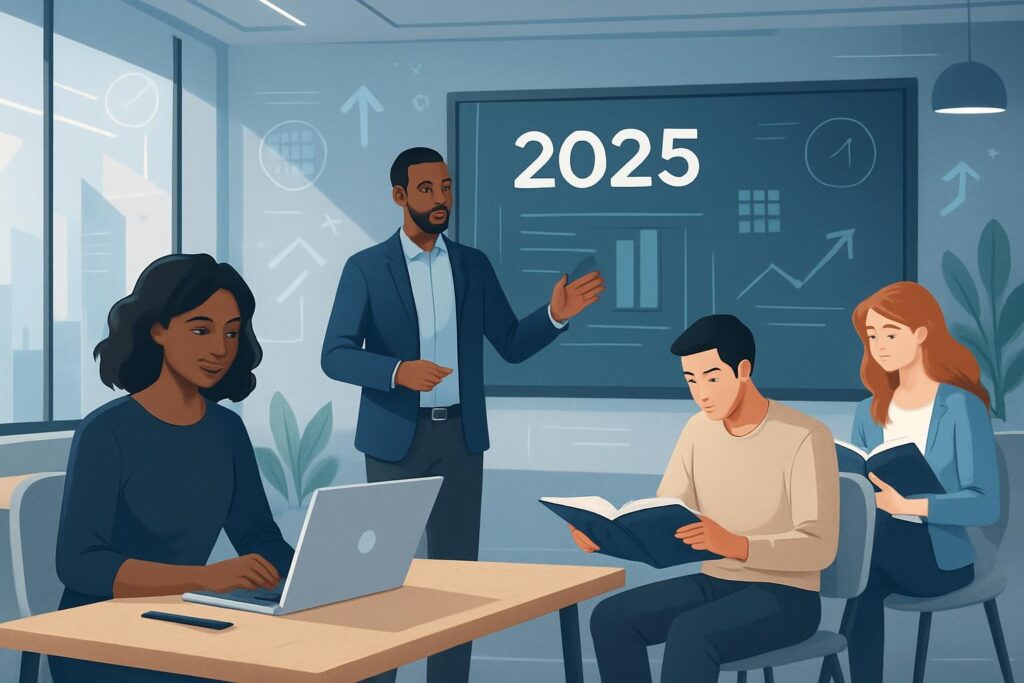
In today’s rapidly evolving world, knowledge has an expiration date. The skills that made you successful yesterday may no longer be enough tomorrow. Industries are being reshaped by technology, automation, artificial intelligence, and globalization at a pace never seen before. In this environment, the ability to adapt is no longer optional—it is the core skill that determines long-term career success. The single most effective way to stay relevant and thrive is by embracing continuous learning.
Continuous learning means consistently updating and expanding your skills, knowledge, and professional abilities throughout your life. It’s not about earning one degree or completing a single training program—it’s a mindset and a habit that transforms how you approach your career. As the World Economic Forum has repeatedly emphasized, lifelong learning is one of the cornerstones of surviving and thriving in the Fourth Industrial Revolution.
This in-depth article explores why continuous learning is the ultimate career advantage in 2025 and beyond. We’ll discuss global trends, industry examples, personal strategies, and frequently asked questions to help you build a roadmap for lifelong growth.
The Changing Nature of Work
Work is no longer defined by static job descriptions. Instead, it is shaped by constant innovation and disruption. McKinsey reports that by 2030, nearly one-third of global jobs will be transformed by automation and AI. Entirely new roles are emerging in fields like machine learning, cybersecurity, and sustainability—roles that didn’t even exist five years ago.
- Automation: Tasks once done by humans are increasingly being handled by machines, from data entry to financial analysis.
- Remote Work: Digital collaboration requires strong online communication and tech literacy.
- New Industries: Clean energy, biotechnology, and the creator economy are creating opportunities for those willing to learn.
Against this backdrop, professionals who remain static risk becoming obsolete. On the other hand, those who practice continuous learning are prepared to pivot, adapt, and seize new opportunities.
Why Continuous Learning is Essential for Career Success
1. Staying Relevant in a Competitive Job Market
Employers in 2025 no longer focus solely on degrees. Instead, they prioritize skills and practical experience. By continuously learning, you ensure your skill set remains aligned with employer needs. For example, a marketing professional who learned AI-driven analytics tools will stand out over peers who rely only on traditional methods.
2. Unlocking Career Growth and Promotions
Learning new skills demonstrates initiative and ambition. Employers are more likely to promote individuals who actively upgrade themselves. Taking a leadership course or mastering advanced project management tools can be the tipping point in securing your next promotion.
3. Building Confidence and Adaptability
Learning doesn’t just provide knowledge—it builds confidence. When faced with new challenges, continuous learners know how to research, adapt, and apply fresh strategies. This adaptability is now one of the most valued workplace traits.
4. Increasing Earning Potential
Upskilled professionals command higher salaries. According to a LinkedIn Learning Report, employees who continuously acquire new certifications earn up to 25% more than peers who remain stagnant. Knowledge is no longer just power—it’s income.
5. Expanding Professional Networks
Many continuous learning opportunities, such as online courses, webinars, and conferences, bring together professionals across industries. These learning environments often lead to networking opportunities that can directly impact career advancement.
Examples of Continuous Learning in Action
Let’s look at real-world cases where continuous learning has transformed careers:
- Amazon: The company invests billions in employee training, ensuring workers can transition into technical and leadership roles.
- Google: Employees are encouraged to dedicate time to learning new skills, contributing to the company’s culture of innovation.
- Healthcare Professionals: Doctors and nurses must engage in continuous education to stay updated with medical advancements.
- Freelancers: Independent professionals regularly upskill to remain competitive in areas like design, software development, and consulting.
How to Practice Continuous Learning
Embracing lifelong learning doesn’t have to be overwhelming. Here are proven strategies to incorporate continuous learning into your career:
- Set Learning Goals: Identify the skills most relevant to your career growth.
- Use Online Platforms: Explore online courses from Coursera, Udemy, or LinkedIn Learning.
- Microlearning: Dedicate 15–30 minutes daily to focused learning.
- Attend Conferences: Gain insights into industry trends and network with peers.
- Seek Mentorship: Learn from those with more experience and diverse perspectives.
- Document Progress: Add new skills and certifications to your CV and LinkedIn profile.
Internal Links for Deeper Guidance
To strengthen your career journey, check out these WashingTana resources:
- 10 Common CV Mistakes and How to Fix Them
- How to Write a Winning Cover Letter
- Job Interview Tips to Impress Employers
- Salary Negotiation Strategies
- Most In-Demand Jobs in 2025
External Expert Insights
For broader context, consider resources from:
- World Economic Forum: Future of Work
- Harvard Business Review: Leadership and Learning
- LinkedIn Learning Insights
- UNESCO: Lifelong Learning Initiatives
Expanded FAQs on Continuous Learning
1. What is continuous learning?
It’s the practice of regularly updating and expanding your skills throughout life to adapt to changing professional demands.
2. How does continuous learning affect career success?
It makes you more adaptable, employable, and prepared for promotions or career changes.
3. Can continuous learning replace a traditional degree?
No, but it complements degrees and keeps your knowledge current long after graduation.
4. What are some quick ways to practice continuous learning?
Microlearning, podcasts, webinars, and short online certifications are efficient methods.
5. Is continuous learning expensive?
Not necessarily—many courses and resources are free or low-cost, especially online.
6. What industries benefit most from continuous learning?
Technology, healthcare, education, and business all require ongoing upskilling.
7. How can I balance learning with a full-time job?
Set aside 30 minutes daily, integrate learning into commutes, or pursue weekend learning sessions.
8. Should employers support continuous learning?
Yes, companies that invest in employee learning see higher retention and performance rates.
9. What if my employer doesn’t value continuous learning?
Invest in yourself anyway. The skills you gain remain your personal asset and increase your employability elsewhere.
10. How do I prove the value of continuous learning on my CV?
List certifications, projects, and case studies from courses, and highlight practical applications in your role.
Final Thoughts
In a world defined by disruption, continuous learning is no longer a luxury—it is a necessity. It empowers you to stay relevant, advance in your career, and build resilience against uncertainty. Whether you are an entry-level professional or a senior executive, the commitment to lifelong learning will determine your success in 2025 and beyond.
Start today. Take one small step—a course, a podcast, a mentorship session. Over time, these small investments compound into a career that not only survives change but thrives in it.



